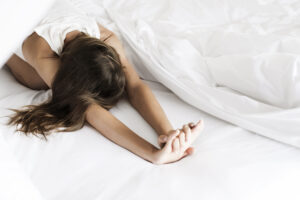I am excited to share some facinating and helpful information on sleep from the book Why We Sleep: Unlocking the Power of Sleep and Dreams by Matthew Walker, Ph.D.* Stay tuned for more health topics related to getting your zzz’s. Today I am sharing information on Sleep and Mental Health.
Statistics/Studies
“The best bridge between despair and hope is a good night’s sleep.” – E. Joseph Cossman
How many times have you woken from a terrible night sleep and your day was already ruined. Your mood was poor, you had little self-control with eating, and you were irritable with others? There is good reason for it.
A study was conducted with perfectly healthy sleepers allowing them to get deep NREM sleep but each time they entered REM sleep, it was interrupted. Each time they interrupted the REM, they were allowed to go back to sleep. The seven-night study ended after three nights when the individuals were showing signs of phychosis! They became anxous, moody, had hallucinations, and showed paranoia thinking the staff was poisoning them. This study demonstrated the dire effects when in lack of REM sleep.
Many of the genes that show abnormalities in mental illness, are the same genes that control sleep and the circadian rhythm. Getting proper sleep is essential to our mental health (understatement).
There is good news with mental health as it relates to sleep. Turns out, sleep therapy has shown to actually heal the minds of numerous psychiatric patients with conditions such as: depression, bipolar, anxiety, and suicide.
How REM Sleep Affects Mental Health
The areas of the brain that are activated during REM include some deep emotional centers (amygala and cingulate cortex). In fact, these areas of the brain are 30% more active when we dream than when we are awake.
Take note that REM sleep occurs primarily in the second half of the night. Also, not all dreaming is considered REM as we do dream during light sleep stages (the dreams are just not as emotionally charged).
REM sleep is thought to be a form of therapy for our emotional health. In fact, 35-55% of our dreams are related to stressors and trauma that have happened the previous day. And when getting proper REM sleep, it’s almost as though the process of dreaming dulls the emotional charge of these experiences and often gives us resolution or closure.
One may wonder then what happens with PTSD. PTSD sufferers have much higher levels of a chemical called noradrenaline in their bodies preventing proper REM sleep. In this situation, REM sleep is either not happening or gets interrupted thus not allowing the person to resolve trauma. The mind then tries again the next night with little success often waking from awful nightmares. This process continues night after night in an attempt to resolve the trauma with little success to maintain the full REM cycle.
Some good news is that researchers accidentally found a blood pressure drug called prazosin helping these patients enter REM sleep by suppresssing the noradranaline chemical in the body. In fact, the VA is now using this drug today to treat PTSD.
Sleep Optimization Solutions
Are you convinced of the importance of a good nights sleep as it relates to mental health as well as other health aspects? As shown in our last post on sleep, here are some tips on improving your zzz’s:
- Avoid caffeine, alcohol and nicotine esp. late afternoon and evening hours
- Consider dim lighting during evening hours
- Avoid blue light from electronic devices. Utilize blue light blocking glasses and twilight settings
- Keep your bedroom cool during sleep (65 degrees F optimal)
- Aim for complete darkness when sleeping (blackout curtains work well)
- Establish a regular bedtime and waketime for regulating your circadian rhythm and get exposure to sunlight first thing in morning
- Avoid napping after 3pm
- Exercise daily preferably at a set time (morning light outdoors is ideal)
- Consider a wind-down routine before bedtime to train your brain that sleep is coming
- A hot bath can help with drowsiness before bed
- Avoid being too hungry or too full at bedtime and minimize sugar (stop eating 3 hours prior sleep)
- Don’t lie in bed awake more than 20 minutes
- Consider medications that may be affecting your sleep and talk to your doctor
- If you feel you suffer from insomnia or another sleep disorder, consider visiting the National Sleep Foundation website for sleep centers. You can also find a sleep medicine doctor in your area (little sleep training is given to general medicine doctors).
- Cognitive Behavioral Therapy (CBT) has shown great results for optimizing sleep rhythms (work with a practitioner)
Resource
Why We Sleep: Unlocking the Power of Sleep and Dreams by Matthew Walker, Ph.D.*
*Matthew Walker is a professor of Neuroscience and Psychology at UC Berkeley, the Director of its Sleep and Neuroimaging Lab, and a former Professor of Psychiatry at Harvard University. He has published over 100 scientific studies and has appeared on 60 Minutes, Nova, BBC News, and NPR’s Science Friday.
About Linda

Health educator, author, and speaker, Linda Curry, facilitates, “Attaining health one bite at a time,” through simplifying health and growth strategies with wisdom, compassion, acceptance and practicality. Linda offers customized health consultations, cooking instruction and coaching as one-size does not fit all. Check out her Youtube Channel for recipes or her 13-week Get-Healthy Makeover Series.

